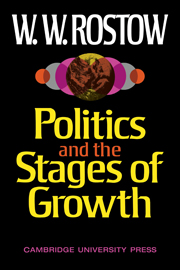Book contents
- Frontmatter
- Contents
- Tables
- PREFACE
- INTRODUCTION
- 1 A way of looking at politics
- 2 Politics in pre-Newtonian societies
- 3 The politics of the preconditions for take-off
- 4 The politics of the take-off and the drive to technological maturity
- 5 American politics: a not so special case
- 6 The politics of the search for quality
- 7 Politics and democracy in the contemporary developing world
- 8 War and peace in the global community
- APPENDIX: The views of others in relation to the approach taken here
- NOTES
- INDEX
1 - A way of looking at politics
Published online by Cambridge University Press: 16 October 2009
- Frontmatter
- Contents
- Tables
- PREFACE
- INTRODUCTION
- 1 A way of looking at politics
- 2 Politics in pre-Newtonian societies
- 3 The politics of the preconditions for take-off
- 4 The politics of the take-off and the drive to technological maturity
- 5 American politics: a not so special case
- 6 The politics of the search for quality
- 7 Politics and democracy in the contemporary developing world
- 8 War and peace in the global community
- APPENDIX: The views of others in relation to the approach taken here
- NOTES
- INDEX
Summary
Politics is here taken to be the exercise of power, within a defined territory, through government. This book examines the kind of power that goes with the concept of sovereignty – in particular, the power to deal with other sovereignties; to mobilize and expend resources for growth and welfare; and to dispense justice, on the one hand, enforce law and order, on the other.
Behind sovereignty is man himself whose nature is defined in three hypotheses which underlie the whole argument that follows.
THREE HYPOTHESES ABOUT MAN
Man: A Balancing, Not a Maximizing, Unit
The first hypothesis is that man is caught up in an effort to balance different and often conflicting impulses and aspirations, in the face of the environment he confronts. His actions represent a choice among the realistic alternatives he perceives to be available; and man must allocate his scarce time and energy, talent and physical resources among these perceived options. Or, in Freud's phrase: ‘Happiness … is a problem of the economics of the individual's libido’ – a problem man solves mainly below the level of full consciousness.
In dealing with consumers' demand, the economist has provided an elegant mechanism for reflecting and summing up the net choices unique human beings make as they set their priorities among the market alternatives before them, at given levels of real income. Only occasionally do economists probe beneath the process of choice by which the consumer equates relative marginal utility among his options.
In dealing with the entrepreneur the economist has provided an equally elegant formal mechanism for reflecting the producer's effort to maximize his profit in the face of given technologies, costs, and market possibilities.
- Type
- Chapter
- Information
- Politics and the Stages of Growth , pp. 7 - 25Publisher: Cambridge University PressPrint publication year: 1971



